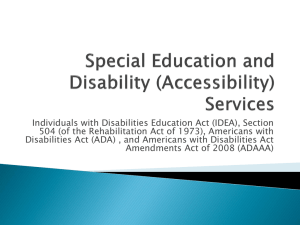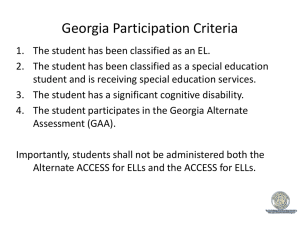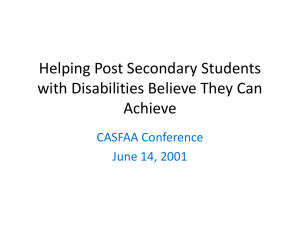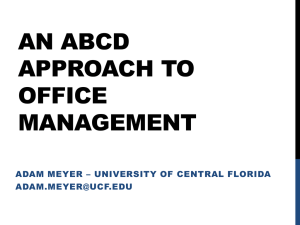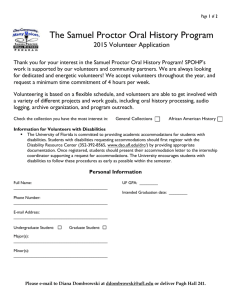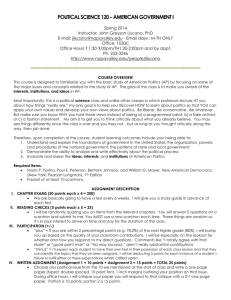Office of Disabilities Services Mon. – Fri. 8 am – 4:30 pm 414
advertisement
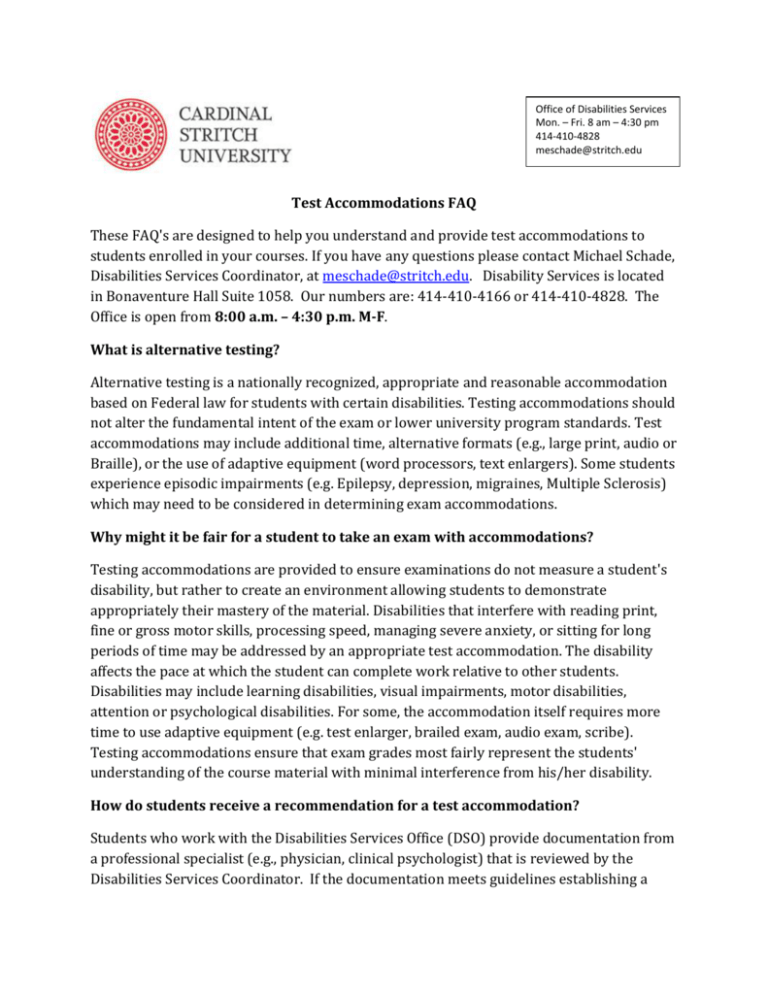
Office of Disabilities Services Mon. – Fri. 8 am – 4:30 pm 414-410-4828 meschade@stritch.edu Test Accommodations FAQ These FAQ's are designed to help you understand and provide test accommodations to students enrolled in your courses. If you have any questions please contact Michael Schade, Disabilities Services Coordinator, at meschade@stritch.edu. Disability Services is located in Bonaventure Hall Suite 1058. Our numbers are: 414-410-4166 or 414-410-4828. The Office is open from 8:00 a.m. – 4:30 p.m. M-F. What is alternative testing? Alternative testing is a nationally recognized, appropriate and reasonable accommodation based on Federal law for students with certain disabilities. Testing accommodations should not alter the fundamental intent of the exam or lower university program standards. Test accommodations may include additional time, alternative formats (e.g., large print, audio or Braille), or the use of adaptive equipment (word processors, text enlargers). Some students experience episodic impairments (e.g. Epilepsy, depression, migraines, Multiple Sclerosis) which may need to be considered in determining exam accommodations. Why might it be fair for a student to take an exam with accommodations? Testing accommodations are provided to ensure examinations do not measure a student's disability, but rather to create an environment allowing students to demonstrate appropriately their mastery of the material. Disabilities that interfere with reading print, fine or gross motor skills, processing speed, managing severe anxiety, or sitting for long periods of time may be addressed by an appropriate test accommodation. The disability affects the pace at which the student can complete work relative to other students. Disabilities may include learning disabilities, visual impairments, motor disabilities, attention or psychological disabilities. For some, the accommodation itself requires more time to use adaptive equipment (e.g. test enlarger, brailed exam, audio exam, scribe). Testing accommodations ensure that exam grades most fairly represent the students' understanding of the course material with minimal interference from his/her disability. How do students receive a recommendation for a test accommodation? Students who work with the Disabilities Services Office (DSO) provide documentation from a professional specialist (e.g., physician, clinical psychologist) that is reviewed by the Disabilities Services Coordinator. If the documentation meets guidelines establishing a disability, the student and the coordinator sign paperwork giving us permission to send a letter requesting accommodations to the professor. Students should also talk to their faculty about their disability. Faculty can also refer students to the DSO located in Bonaventure Hall Suite 1058. The coordinator of the DSO is also available to consult with faculty regarding the requested accommodations. Who provides testing accommodations? Like regularly administered exams, many accommodations are provided by the faculty or teaching assistant. Providing test accommodations within the department offers students with disabilities comparable access to instructors during tests and facilitates last minute changes or clarifications to exam questions. Exams requiring more complex accommodations (e.g., brailed exams, scribe, etc.) can be provided by the DSO. Exams taken at the DSO require students and faculty to work together in a timely manner. Throughout the testing process, the students' right to confidentiality shall be maintained. When and where are accommodations provided? Generally, exams overlap the time of the regularly scheduled class exams. Occasionally, due to schedule conflicts or back-to-back classes, students may take exams before or after the regularly scheduled class times. Test sites in the department may include adjacent classrooms, faculty offices, libraries or conference rooms. Exams administered through the DSO are administered in our testing rooms in Bonaventure 1058 under the supervision of the Disabilities Services Coordinator. Procedures are: 1) The student speaks with the instructor about his/her intent to take the test at DSO, and an appropriate date/time is agreed upon to take the test. 2) The student schedules the test appointment by contacting the One Stop Desk or Disabilities Services Coordinator. 3) The student must schedule a test two business days before the test (not counting the day of the test). 4) Professors are to provide the test and completed Test Accommodation Form to the DSO by 4:30 p.m. on the day before the test, or contact the DSO at meschade@stritch.edu to explain when the test will be provided. A professor may either email or drop off the test and form. 5) When the student comes to take the test their time is marked from when they arrive and will be told when the allotted accommodation time has elapsed. 6) No cell phones, backpacks, books, or other academic materials are allowed in exam spaces. What happens if faculty feels the requested accommodation is inappropriate? Who has the final authority to determine appropriate test accommodations for students with disabilities? Ultimately, the institution has the authority to decide the appropriateness of accommodations through a multi-level appeals process. However, most decisions are made via communication between the student and the faculty, with additional input from the DSO as needed. Students communicate the test accommodations recommended by the disabilities services coordinator. This is based on the student's disability and the general test conditions. The coordinator may consult with faculty when an accommodation request is unusual or there is concern that the accommodation could fundamentally alter the intent of the exam. Faculty may accept, modify or deny the recommendation. If accepted or modified to the satisfaction of the parties involved, the authority can be thought of as residing within the collaborative process. If there is not a mutually agreed upon accommodation, or if a faculty member denies an accommodation, the student may appeal the decision. While an appeal is in process, services endorsed by the director must continue during the grievance process. Please refer to the section on Grievance Procedures. What happens when a student makes a late request for testing accommodations? Students are responsible for providing adequate notice to faculty and the DSO in order to receive test accommodations. The DSO asks students to notify their faculty within the first three weeks of class. (Sometimes a student acquires a disability during the semester so this is not always possible). The DSO requires that students give notice of the intent to use granted accommodations (via Semester Release of Information Form) no later than 5 working days before a test date. For both faculty and the DSO, an inability to accommodate an exam may be justified when a request is made with inadequate notice. Where can faculty direct questions about testing accommodations? Student: Faculty members are encouraged to first ask their questions of the student. Students receive testing orientation at the DSO and may be able to answer the questions or concerns. Disabilities Services Office: Questions about the impact of the disability or the appropriateness of the requested accommodation can be directed to Michael Schade, Disabilities Services Coordinator, at 414-262-4828 or meschade@stritch.edu. The DSO is open from 8:00 – 4:30 M-F. Disabilities Services Website: the Disability Services web page on the Cardinal Stritch University website (stritch.edu) provides information regarding disability issues, confidentiality, campus policies and procedures and relevant links.

